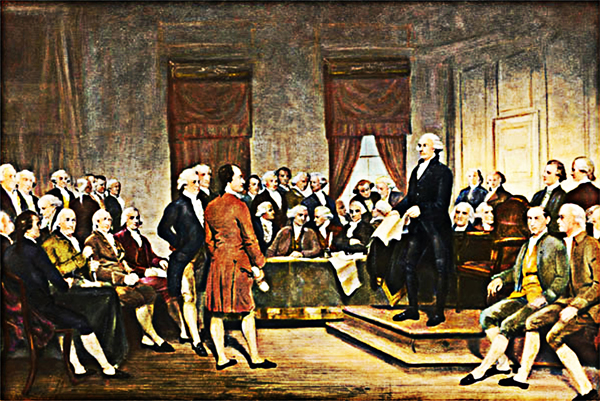
Washington informs Congress of espionage on October 05, 1775
Washington informs Congress of espionage: On this day in 1775, General George Washington writes to the president of the Continental Congress, John Hancock, to inform him that a letter from Dr. Benjamin Church, surgeon general of the Continental Army, to Lieutenant General Sir Thomas Gage, British commander in chief for North America, had been intercepted. Washington wrote, “I have now a painful tho’ a Necessary Duty to perform respecting Doctor Church, Director General of the Hospital.”
Washington described how a coded letter to a British officer, Major Crane, came into Washington’s possession by a convoluted route from “a Woman who was kept by Doctor Church.” Washington “immediately secured the Woman, but for a long time she was proof against every threat and perswasion[sic] to discover the Author, however at length she was brought to a confession and named Doctor Church. I then immediately secured him and all his papers.”
The woman Washington interrogated was the mistress of Dr. Benjamin Church, a renowned Boston physician, who was active in the Massachusetts Committee of Safety and served as a member of the Provincial Congress. In July 1775, Washington had named Church the first surgeon general of the Continental Army, only to find out three months later that he had been spying for the British since 1772. Church faced an army court martial on October 4, 1775.
Despite Church’s plea of innocence, and the inconsequential nature of the information he provided to Crane, the contents of the letter included Church’s statement of allegiance to the British crown. He was charged with treason, convicted and sentenced to life in prison. After becoming ill while incarcerated, Dr. Church was exiled to the West Indies. The ship in which he traveled is believed to have been lost at sea.
On November 7, 1775, shortly after the conviction of Dr. Church, the Continental Congress added a mandate for the death penalty as punishment for acts of espionage to the “articles of war.”
History Channel / Wikipedia / Encyclopedia Britannica / Library Of Congress / Smithsonian
/ George Washington (YouTube search) 
Painting: “George Washington Addressing the Constitutional Convention”, Junius Brutus Stearns, 1856.
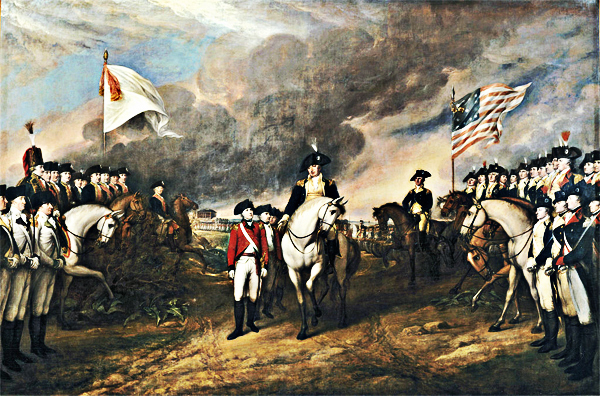
Victory at Yorktown on October 19, 1781
Victory at Yorktown: Hopelessly trapped at Yorktown, Virginia, British General Lord Cornwallis surrenders 8,000 British soldiers and seamen to a larger Franco-American force, effectively bringing an end to the American Revolution.
Lord Cornwallis was one of the most capable British generals of the American Revolution. In 1776, he drove General George Washington’s Patriots forces out of New Jersey, and in 1780 he won a stunning victory over General Horatio Gates’ Patriot army at Camden, South Carolina. Cornwallis’ subsequent invasion of North Carolina was less successful, however, and in April 1781 he led his weary and battered troops toward the Virginia coast, where he could maintain seaborne lines of communication with the large British army of General Henry Clinton in New York City. After conducting a series of raids against towns and plantations in Virginia, Cornwallis settled in the tidewater town of Yorktown in August. The British immediately began fortifying the town and the adjacent promontory of Gloucester Point across the York River.
General George Washington instructed the Marquis de Lafayette, who was in Virginia with an American army of around 5,000 men, to block Cornwallis’ escape from Yorktown by land. In the meantime, Washington’s 2,500 troops in New York were joined by a French army of 4,000 men under the Count de Rochambeau. Washington and Rochambeau made plans to attack Cornwallis with the assistance of a large French fleet under the Count de Grasse, and on August 21 they crossed the Hudson River to march south to Yorktown. Covering 200 miles in 15 days, the allied force reached the head of Chesapeake Bay in early September.
Meanwhile, a British fleet under Admiral Thomas Graves failed to break French naval superiority at the Battle of Virginia Capes on September 5, denying Cornwallis his expected reinforcements. Beginning September 14, de Grasse transported Washington and Rochambeau’s men down the Chesapeake to Virginia, where they joined Lafayette and completed the encirclement of Yorktown on September 28. De Grasse landed another 3,000 French troops carried by his fleet. During the first two weeks of October, the 14,000 Franco-American troops gradually overcame the fortified British positions with the aid of de Grasse’s warships. A large British fleet carrying 7,000 men set out to rescue Cornwallis, but it was too late.
On October 19, General Cornwallis surrendered 7,087 officers and men, 900 seamen, 144 cannons, 15 galleys, a frigate, and 30 transport ships. Pleading illness, he did not attend the surrender ceremony, but his second-in-command, General Charles O’Hara, carried Cornwallis’ sword to the American and French commanders. As the British and Hessian troops marched out to surrender, the British bands played the song “The World Turned Upside Down.”
Although the war persisted on the high seas and in other theaters, the Patriot victory at Yorktown effectively ended fighting in the American colonies. Peace negotiations began in 1782, and on September 3, 1783, the Treaty of Paris was signed, formally recognizing the United States as a free and independent nation after eight years of war.
History Channel / Wikipedia / Encyclopedia Britannica /British Battles / George Washington's Mount Vernon.org / Library of Congress.gov
/ Victory at Yorktown on October 19, 1781 (YouTube search) 
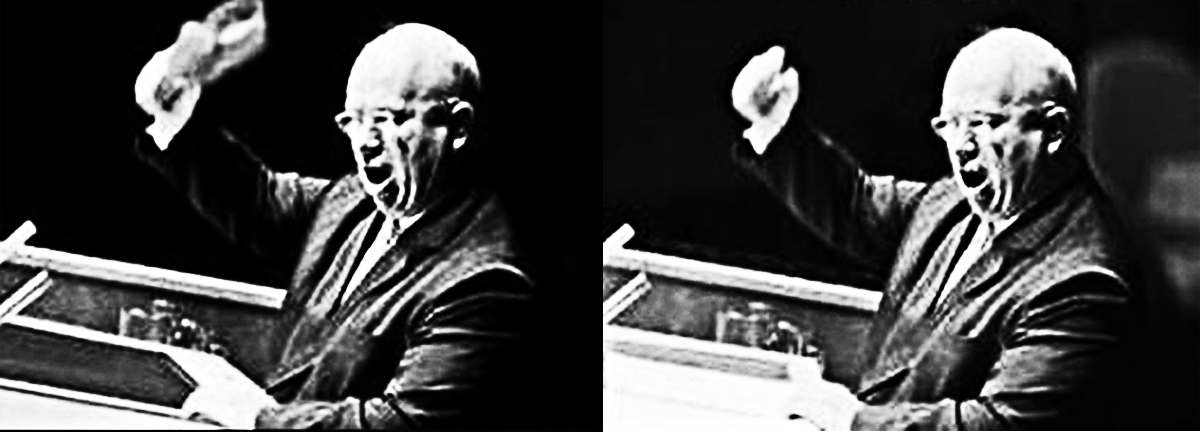
Cold War: Nikita Khrushchev pounds his shoe on a desk at United Nations General Assembly on October 12, 1960
Cold War: Nikita Khrushchev pounds his shoe on a desk at United Nations General Assembly:
In one of the most surreal moments in the history of the Cold War, Russian leader Nikita Khrushchev removes his shoe and pounds a table with it in protest against a speech critical of Soviet policy in Eastern Europe. During a debate over a Russian resolution decrying colonialism, a representative of the government of the Philippines charged the Soviets with employing a double standard, pointing to their domination of Eastern Europe as an example of the colonialism they were criticizing in their resolution.
In response, Khrushchev took off one of his shoes and began to furiously pound the table. The chaotic scene finally ended when General Assembly President Frederick Boland (Ireland) broke his gavel calling the meeting to order, but not before the image of Khrushchev as a hotheaded buffoon was indelibly etched into America’s collective memory.
History Channel / Wikipedia / Encyclopedia Britannica
/ Global Security.org / Russia Today / CBS News
/ Nikita Khrushchev pounds his shoe on a desk at United Nations General Assembly on October 12, 1960 (YouTube search) 
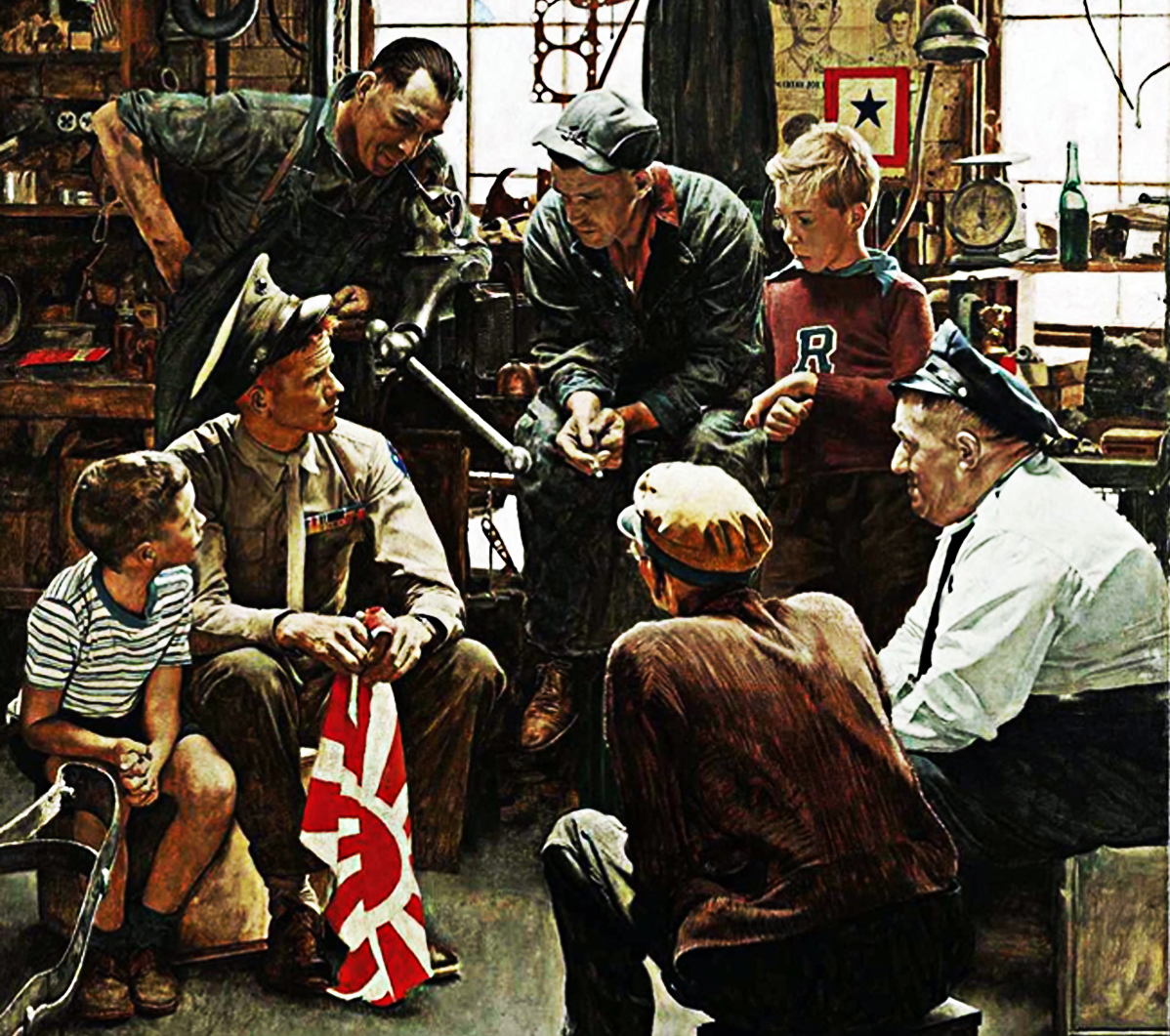
Understanding Military Terminology
Repatriation
(DOD) 1. The procedure whereby American citizens and their families are officially processed back into the United States subsequent to an evacuation.
See also Evacuation.
Joint Publications (JP 3-68) Noncombatant Evacuation Operations
2. The release and return of enemy prisoners of war to their own country in accordance with the 1949 Geneva Convention Relative to the Treatment of Prisoners of War.
Joint Publications (JP 1-0) Department of Defense Dictionary of Military and Associated Terms
Replacement In Kind
(DOD) The provision of material and services for a logistic exchange of materials and services of equal value between the governments of eligible countries.
Also called RIK.
Joint Publications (JP 1-06) Financial Management Support to Joint Operations
Reportable Incident
(DOD) Any suspected or alleged violation of Department of Defense policy or of other related orders, policies, procedures or applicable law, for which there is credible information.
Joint Publications (JP 3-63) Detainee Operations - Intelligence Resource Program
Joint Publication - Department of Defense Dictionary of Military and Associated Terms
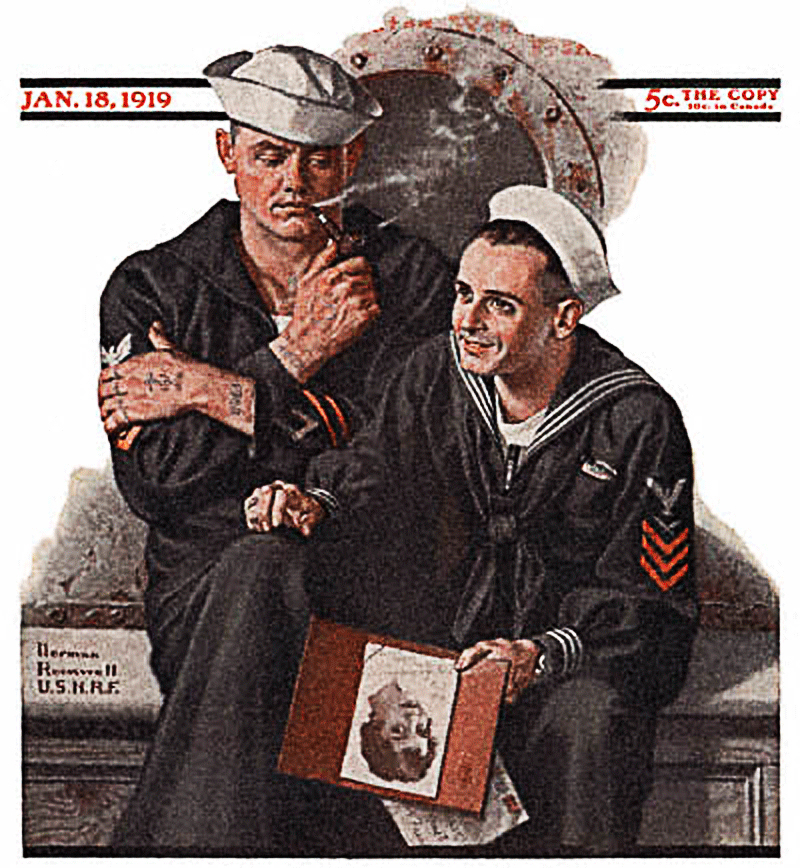
The Old Salt’s Corner
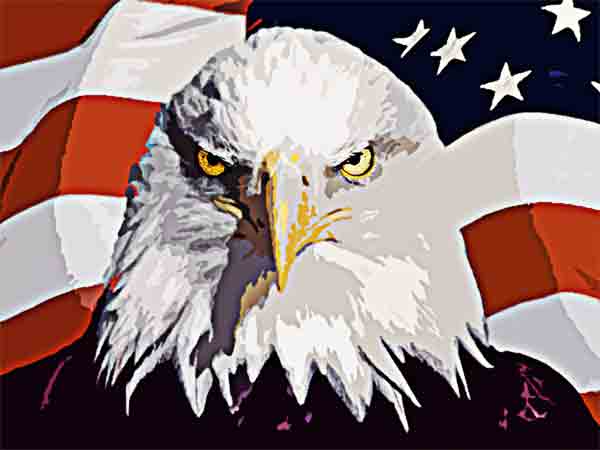
“Warriors' Hymn”
Lord, place Thy Hand on the yoke of those who fly,
And guide them through the vast reaches of the sky.
Bring them safely through their perilous flight,
And may they ever look to Thee as their Guiding Light.
Lord, protect the sailors who sail the treacherous seas.
Calm the roiling waters that they may cruise with ease.
May they always look to Thee as their Pilot for support,
And with Thy guiding hand, bring them safely home to port.
Lord, protect the soldier with Thy mighty sword midst the battle.
Give him strength to press on despite the muskets' rattle.
Hear his fervent supplication for Thy protection from all harm,
And provide him with courage as he leans on Thy eternal arm.
Lord, shield the brave marine as he storms the dangerous strand.
Strengthen him with fortitude and provide Thy protective hand.
Surround him with Thy angels as he strives to overcome the foe.
Bring him safely through the conflict and upon him honor bestow.
Lord, bless and provide comfort to his family, for they also serve.
Until that day they are one again, give them hope and steady nerve.
Hear their prayers O' Lord, for the safe return of heroes dear,
And from their trust, hope and faith in Thee, may they never veer.
~ Robert L. Hinshaw, CMSgt, USAF, Retired

“I’m Just Sayin”
“Stupidity is a talent for misconception.”
“Science has not yet taught us if madness is or is not the sublimity of the intelligence.”
“All that we see or seem is but a dream within a dream.”
“Once upon a midnight dreary,
while I pondered weak and weary.”
“I became insane,
with long intervals of horrible sanity.”
“I have no faith in human perfectibility.
I think that human exertion will have
no appreciable effect upon humanity.
Man is now only more active
not more happy – nor more wise,
than he was 6000 years ago.”
~ Edgar Allan Poe

“Thought for the Day”
“I don't think we need more gun control laws.”
“I think we need more idiot control.”
“Sometimes the majority just means all the fools are on the same side.”
“With all due respect, I am against dumb.”
“I happen to believe there is evil in the world.”
“Power does not change you, it unmasks you.s”
“A good lawyer is going to try to protect her client.”
“Too many people treat parenting like it's the 20th item on their to-do list.”
“You're innocent until proven guilty.”
“The Bill of Rights is not an a la carte menu.”
“Just because you've seen ‘My Cousin Vinny’
doesn't qualify you to be a federal judge.”
“I don't know a country in the world that doesn't have borders
and doesn't want to know who is coming into their country.”
“Algorithms diminish public safety in this country
They ask us to pretend that lengthy arrest records and violent crimes don't matter.
They ask police to scoop up the bad guys only for the courts to immediately release them.
They turn us into a bad joke.”
“The Democratic position seems to be everything is going to be free.
Free education.
Free health care.
Free housing.
Free love.
Free kittens.
I don't know.”
~ John Kennedy (Louisiana Senatorn)

“What I Learned”
“It is better to keep your mouth closed and let people think you are a fool than to open it and remove all doubt.”
“The secret of getting ahead is getting started.”
“There are lies, damned lies and statistics.”
“The human race has one really effective weapon, and that is laughter.”
“Denial ain't just a river in Egypt.”
“It's not the size of the dog in the fight,
it's the size of the fight in the dog.”
“All you need in this life is ignorance and confidence,
and then success is sure.”
“Whenever you find yourself on the side of the majority,
it is time to pause and reflect.”
“The fear of death follows from the fear of life.
A man who lives fully is prepared to die at any time.”
“If it's your job to eat a frog,
it's best to do it first thing in the morning.
And If it's your job to eat two frogs,
it's best to eat the biggest one first.”
~ Mark Twain
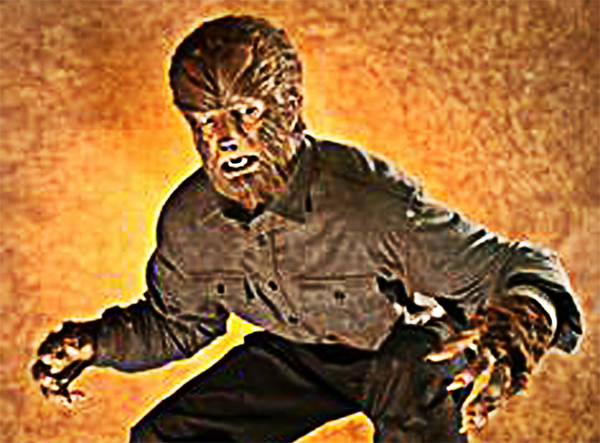
Mr. Answer Man Please Tell Us: Why Are Some Men's Beards a Different Color Than Their Hair?
Throughout civilization, beards have acted as a silent communicator.
For some, it's a symbol of virility and power. For others, being hirsute is mandated by religion, marital status, or both. (Amish single men are clean-shaven; husbands are not.) Seeing an unkempt, scraggly beard could be an indication of a person's economic status or their lack of vanity. One man, Hans Langseth, sprouted a 17-foot-long chin warmer for the unique identity it afforded him. (He kept it neatly rolled over a corn cob when he wasn't busy showing it off.)
Langseth's whiskers, which wound up in the Smithsonian, present a curious timeline of his life. The furthest end of the beard was a vibrant brown, grown out when he was younger. The ends closer to his face—and to the end of his life in 1927 - were yellowed.
While age can certainly influence hair and beard color, it doesn't explain why a younger man can sport a decidedly different beard tone than what's on the rest of his head. Other follicular forces are at work.

By default, scalp hair is white. It gets its color from melanin, turning it everything from jet black to dirty blonde. Pheomelanin infuses hair with red and yellow pigmentation; eumelanin influences brown and black. Like shades of paint, the two can mix within the same hair shaft. (Melanin production decreases as we age, which is why hairs start to appear gray.)
But not all follicles get the same dose in the same combination. While you might sport a light brown top, your beard could be predominantly dark brown, or sport patches of lighter hairs in spots. Eyebrow hair will probably appear darker because those follicles tend to produce more eumelanin.
Wondering why these two-toned heads often have a red beard but not red hair, there's an answer for that, too. While all hair color is genetic, one gene in particular, MC1R, is responsible for a red hue. If you inherit a mutated version of the gene from both parents, you're likely to have red hair from head to toe. (Hopefully not too much toe hair.) But if you inherit MC1R from just one parent, it might only affect a portion of your follicles. If that swatch of color annoys you for whatever reason? There’s always beard dye.
Beards.org
• Business Insider
• Encyclopedia Britannica
• Mental Floss
• Wikipedia
• Womans Day
Why Are Some Men's Beards a Different Color Than Their Hair? (YouTube) 
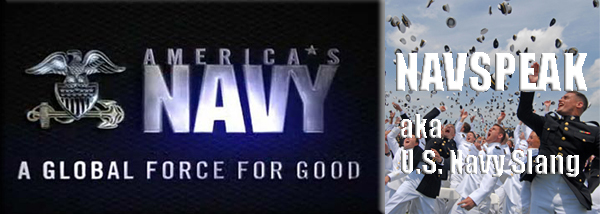
NAVSPEAK aka U.S. Navy Slang
Assholes and Elbows: The only things which should be seen by a boatswains mate when deck hands are on their hands and knees holystoning a wooden deck.
Asshole of the Navy: Norfolk, Virginia, home of the fabled “DOGS AND SAILORS KEEP OFF THE GRASS!” sign.
The cold shoulders from civilians persist in certain Navy towns. See also “NoFuck, Vagina”.
ASVAB: The Navy's enlisted entrance exam. (Armed Services Vocational Aptitude Battery).
ASWOC: All Officers Meeting, held for a variety of reasons like training, port calls, mess issues, etc.
Aviation Queer: The enlisted rating AQ, Aviation Fire Control Technician; since merged into Aviation Electronics Technician (AT).
ASH Receiver: An “ash tray”. Newbie sailors are sometimes sent all over base to locate an ASH Receiver as a joke.
ASMO: Assignment Memorandum Orders. Mostly issued in boot camp to set a recruit back in training due to poor performance.
Wiktionary.org
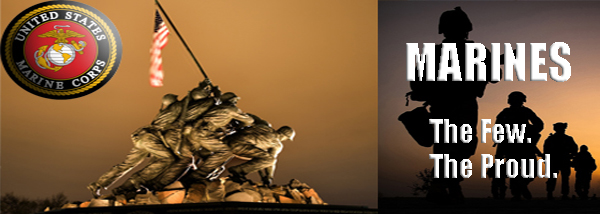
Just for you MARINE
ASP: Ammunition Supply Point, where ammo is stored and issued.
ASVAB Waiver: Insinuates someone's inability to pass the Armed Services Vocational Aptitude Battery (ASVAB).
Arty Short for Artillery.
As You Were As You Were Order to disregard the immediately preceding order.
Asiatic World War II term for eccentric behavior characteristic of men serving too long in the Far East.
At Ease At Ease Command given to subordinate that he no longer needs to stand at attention. Is also used as slang as a way to tell someone to chill out or calm down.
Wikipedia.org

Naval Aviation Squadron Nicknames
Electronic Attack Squadron 129 (VAQ-129) - nicknamed the “Vikings”
United States Navy - Naval Air Station Whidbey Island, in Puget Sound, Washington.
List of United States Navy aircraft squadrons - Wikipedia.org

Where Did That Saying Come From?

“Trick or treat?” Meaning: The ultimatum given by children who call on houses to solicit gifts at Hallowe'en.
There could hardly be a better example of the way that language and traditions migrate over time and across different cultures than trick or treating. This is well-known to be an American tradition, but its origins lie in medieval Europe.
There are myriad Christian and pagan rituals and celebrations that have taken place on or about the 1st of November each year. These occurred in virtually every English-speaking and/or Christian country. They have evolved and merged over the centuries and continue to do so. Common features of these traditions are - asking for food, dressing in disguise and a connection to the spirits of the deceased.
The language of these traditions is heavily influenced by the naming of days in the Christian calendar. The central date of the rituals that herald the beginning of winter is the 1st of November, called All Saints Day or All Hallows Day. The following day is All Souls Day and the 31st of October is All Hallows Eve - shortened to Hallowe'en (that is, the evening before All Hallows Day).
The practice of souling - going from door to door on or about All Souls Day to solicit gifts of food in return for prayers for the dead - evolved from a pagan ritual that was practiced all over Europe, possibly as early as the 10th century. As a Christian tradition it goes back to at least the 14th century, when it is mentioned by Chaucer. It is still commonplace in many Catholic countries, notably Ireland, where soul-cakes are left out for the departed. The first reference to the practice under that name in England is John Brand's Popular Antiquities of Great Britain, 1779:
“On All Saints Day, the poor people go from parish to parish a Souling, as they call it.”
The tradition has altered so that it is now children, usually dressed in disguise, who go about asking for gifts around the beginning of November. Some examples of this are from:
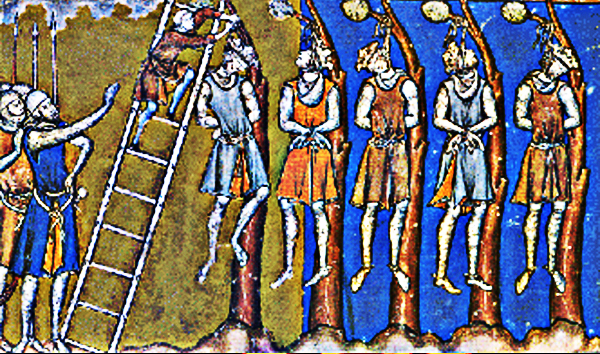
England, where we have requests for 'a penny for the guy'. This derives from the bonfire celebrations that began to celebrate the thwarting of the Gunpowder Plot in 1605. Guy Fawkes was the explosives specialist of the plot. He was scheduled to be hanged, drawn and quartered, but escaped that fate by prematurely hanging himself by jumping from the scaffold with the noose around his neck. He is now symbolically re-executed each year on 5th November (Bonfire Night), when effigies of him, called guys, are burned on bonfires all over England. The 'pennies' that children collect are traditionally spent on fireworks. This had a secular and political rather than religious or supernatural motivation, but it clearly inherited much from souling.
The earliest known citation of trick or treat in print is from an item in the Oregon newspaper The Oregon Journal, 1st November 1934, headed 'Halloween Pranks Keep Police on Hop':
“Other young goblins and ghosts, employing modern shakedown methods, successfully worked the 'trick or treat' system in all parts of the city.”
Phrases.org UK
hr class="article-hr">

Where Did That Saying Come From?

“Let your hair down” Meaning: To relax or be at ease. Behave in a free or uninhibited manner.
Origin: Parisian nobles risked condemnation from their peers if they appeared in public without an elaborate hairdo. Some of the more intricate styles required hours of work, so of course it was a relaxing ritual for these aristocrats to come home at the end of a long day and let their hair down.
Letting one's hair down was a commonplace part of womens' daily activities in the 17th century. The hair was normally pinned up and was let down for brushing or washing. The term used for this at the time was dishevelling. Anyone who is unkempt and generally untidy might now be described as dishevelled but then it applied specifically to hair which was unpinned. The first reference I can find which refers specifically to this is John Cotgrave's, The English treasury of wit and language, 1655:
“Descheveler, to discheuell; to pull the haire about the eares.”
Phrases.org UK

Science & Technology
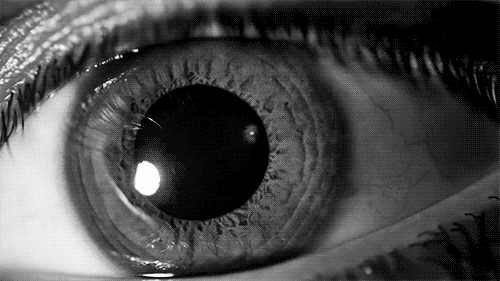
FEATURE: Study shows that eye movements decrease while effortfully listening to speech
• Himalayan valley sizes are controlled by tectonic-driven rock uplift, study shows
Scientists make the first observation of a nucleus decaying into four particles after beta decay
• Farms that create habitat key to food security and biodiversity
• Two distinct charge density wave orders and their intricate interplay with superconductivity in pressurized CuTe
Study suggests single dose of psilocybin safe and effective as treatment for major depressive disorder
• Exploring the effects of hardware implementation on the exploration space of evolvable robots
• A technique to facilitate the robotic manipulation of crumpled cloths
Improving CAR T-cell and monoclonal antibody treatment through epitope editing
• Modeling the potential of kidney disease with an integrated organoid omics map
• Air pollution prevents pollinators from finding flowers, study shows
Phys.org / MedicalXpress / TechXplore

FEATURE: Let's stop for a bite along the way': Why it's important to understand Arctic whales' migratory foraging habits
• Mysterious ultra-high energy source investigated by astronomers
Experimental quantum imaging distillation with undetected light
• Why bats carry viruses that have higher fatality rates in humans than those from other mammals
• Let sleeping dogs lie? New study suggests they can process vocalizations even while they snooze
Beaver activity in the Arctic linked to increased emission of methane greenhouse gas
• Using lignin and a catalyst to create an alternative to bisphenol A (BPA)
• Table salt offers a safe, inexpensive and reusable pathway to recovering useful products from plastic waste
Downstream RNA hairpins found orchestrating mRNA translation
• New physics-based self-learning machines could replace current artificial neural networks and save energy
• More cases of breast cancer detected with the help of AI
Phys.org / MedicalXpress / TechXplore

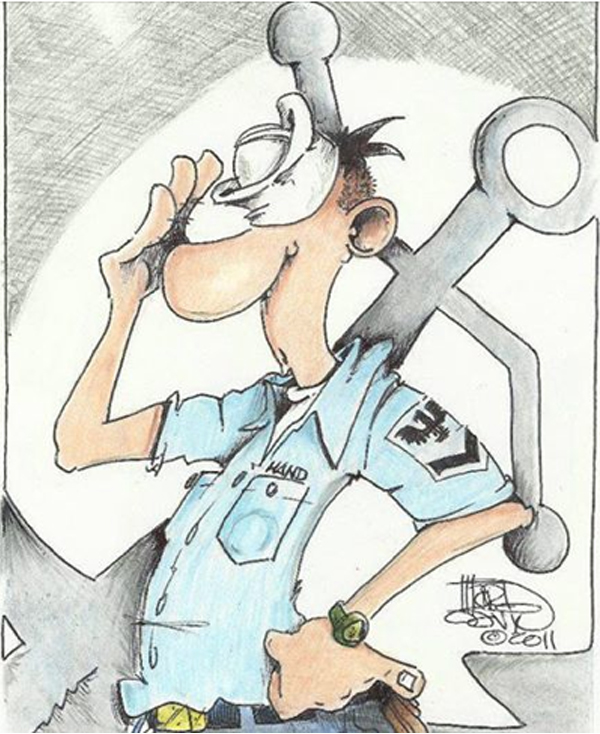
SONG FACTS
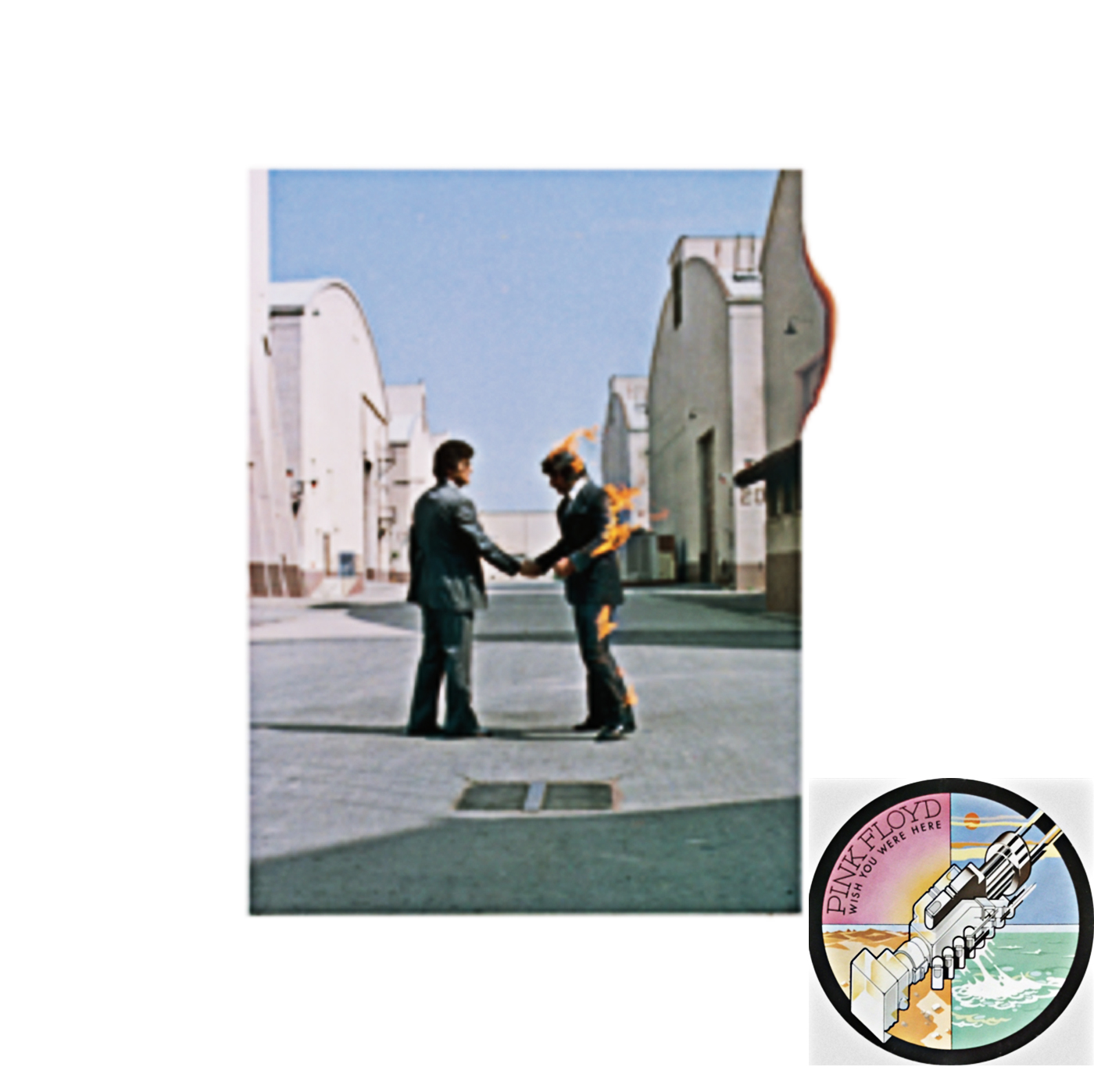
“Wish You Were Here”  - Pink Floyd
- Pink Floyd
Album: Wish You Were Here
Released 1975 
“Wish You Were Here”  is about the detached feeling many of us float through life with. It's a commentary on how people cope with the world by withdrawing physically, mentally, or emotionally. The main inspiration was Pink Floyd founding member Syd Barrett and his ordeal with schizophrenia.
is about the detached feeling many of us float through life with. It's a commentary on how people cope with the world by withdrawing physically, mentally, or emotionally. The main inspiration was Pink Floyd founding member Syd Barrett and his ordeal with schizophrenia.
Roger Waters based the song on a poem he wrote about Syd Barrett's break from reality. In a 2022 interview on the Joe Rogan Experience, he clarified that
“Wish You Were Here”  was “partially” about Barrett, adding, “And I do wish he was here.&rdquo
was “partially” about Barrett, adding, “And I do wish he was here.&rdquo
Waters believes LSD fed into Barrett's eventual insanity but wasn't the sole cause, as he suspected Barrett was already teetering on the edge of schizophrenia.
Waters watched Barrett slowly unwinding as the band rose to stardom, particularly after they released
“Arnold Layne” 
One anecdote Waters recalls in the interview is walking with Barrett outside Capitol Records in Los Angeles.
Barrett looked at him and said, “It's nice here in Las Vegas, isn't it?” His face then darkened, and he spat out the word, “People!” The moment was characteristic of the disjoined nature of Barrett's mind leading up to his total break with reality.
Barretts decline was personally painful but also professionally frightening, as the band relied on him to write the bulk of their songs.
When Waters realized they were losing him, he took control of the songwriting.
This was a rare case of the Pink Floyd primary songwriters Roger Waters and David Gilmour mutually collaborating on a song - they rarely wrote together.
Gilmour had the opening riff written and was playing it in the studio at a fast pace when Roger Waters heard it and asked him to play it slower. The song built from there, with the pair writing the music for the chorus and verses together, and Waters adding the lyrics.
“Wish You Were Here” is the title track to Pink Floyd's ninth album, their follow-up to “The Dark Side Of The Moon”. The song reflects the feeling in the studio while they were recording the album. Waters felt they had checked out and weren't putting a full effort into the recording sessions. He once said the song could have been called "Wish We Were Here."
When this song starts, it sounds like it is coming from an AM radio somewhere in the distance. This represents the distance between the listener and the music.
At the end of the song, when the wind is blowing, you can hear the sound of a violin played by Stephane Grappelli, a French jazz musician who was recording in nearby studios.
Pink Floyd asked him to play on the track when they found out he was there.
The theme of absence pervades the album. They chose “Wish You Were Here” as the title track because it summed up the message.
The designer who did their cover art, Storm Thorgerson, was the first to suggest it as the album title.
The album contains images relating to the theme of detachment. The most prominent shows two businessmen shaking hands, with one of them on fire. This represents an insincere business deal, with one of the men about to get burned. In all of the images, there is something missing, like the diver who does not make a splash.
Like many Pink Floyd albums, Wish You Were Here doesn't translate nearly as well to CD or streaming. A lot of work went into choosing which songs were on the front and back sides of the album, which is eliminated on the CD, and there is also a lot less room for the artwork, which goes along with the music.
When Pink Floyd was inducted into the Rock and Roll Hall of Fame in 1996, they played
“Wish You Were Here”  at the induction ceremony. Drummer Nick Mason accepted the award but didn't join the performance, while Roger Waters and Syd Barrett didn't attend.
at the induction ceremony. Drummer Nick Mason accepted the award but didn't join the performance, while Roger Waters and Syd Barrett didn't attend.
The small sample of classical music at the beginning of the song is from
“Tchaikovsky's 4th Symphony”  .
.
In the 26th second of the song you can hear a small cough. This was to create the effect of a man listening to the radio and playing along with his guitar. In the 31st second you can hear a sniff. Rumors say that it symbolizes Gilmour quitting smoking, but it could just be the radio and the man.
In the mid-'80s, Roger Waters left the band and assumed Pink Floyd was dissolved. It wasn't:
Davie Gilmour and Nick Mason carried on without him, starting with the 1987 album A Momentary Lapse of Reason.
At his solo concerts, Waters avoided songs he wrote with Gilmour, but “Wish You Were Here” is an exception, played at most of his shows.
“It still brings tears to my eyes when I sing it because it's so important to every day of my life, because we too often fail to make the connections that we ought to”, he said on a 1992 Jim Ladd radio special.
Fred Durst and Wes Borland of Limp Bizkit and Johnny Rzeznik of The Goo Goo Dolls performed this at the 2001 “Tribute To Heroes” telethon to benefit victims of the terrorist attacks on America. Durst, Rzeznik, and Borland appealed to a younger audience, but this song was familiar to the older viewers as well. Almost 60 million people watched the telethon.
Wyclef Jean did a soul-reggae version on his 2 Side II a Book album. He paid credit to Pink Floyd in additional lyrics at the end of the track:
“My brother tune me into rock”
“Put me up on Pink Floyd, a band from the British blocks”
With Nick Mason on drums, Ed Sheeran, Richard Jones of The Feeling, and Mike Rutherford of Genesis performed
“Wish You Were Here”
at the Closing Ceremony of the London 2012 Summer Olympics. This version entered the UK singles chart at #34 the following week. The Pink Floyd original simultaneously landed at #68, marking the first time it had entered the UK top 75.
“Wish You Were Here” - Pink Floyd 1975) Continued ...
MORE SONGS
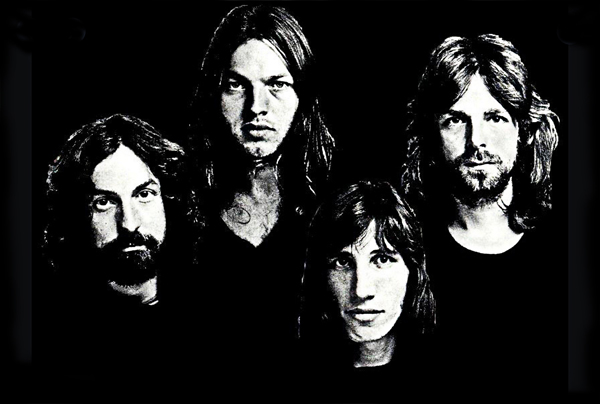
1967
“Interstellar Overdrive”  Live
Live  Video
Video 
1969
“Brain Damage”  Live
Live  Video
Video 
1971
“One of These Days”  Live
Live  Video
Video 
1973
“Us and Them”  Live
Live  Video
Video 
“Time”  Live
Live  Video
Video 
“The Great Gig in the Sky” 
1975
“Wish You Were Here”  Live
Live  Video
Video 
“Shine on You Crazy Diamond”  Live
Live  Video
Video 
“Wish You Were Here” - Pink Floyd 1975) Continued ...
Pink Floyd official site (Pink Floyd Discography) / Rock & Roll Hall of Fame / Billboard / All Music / Song Facts /
Ultimate Classic Rock / Pink Floyd
Image: “Wish You Were Here (album)” by Pink Floyd

Trivia
● In World War II, where was the defensive line known as the “Gin Drinkers Line”?
Answer to Trivia
READ MORE: The Bottle Shop
● What gun manufacturer's first names were Horace and Daniel?
Answer to Trivia
READ MORE: How Products Are Made
● Which four states touch at one point?
Answer to Trivia
READ MORE: Navajo Nation Parks.org
● Despite being fought by European countries, what modern-day country did the Battle of the Plains of Abraham take place?
Answer to Trivia
READ MORE: Wikipedia

Joke of the Day

The Glass Is Half-Full Or The Glass Is Half-Empty
Understanding Engineers
To the optimist, the glass is half-full
To the pessimist, the glass is half-empty.
To the engineer, the glass is twice as big as it needs to be.
What is the difference between mechanical engineers and civil engineers?
Mechanical engineers build weapons.
Civil engineers build targets.





























